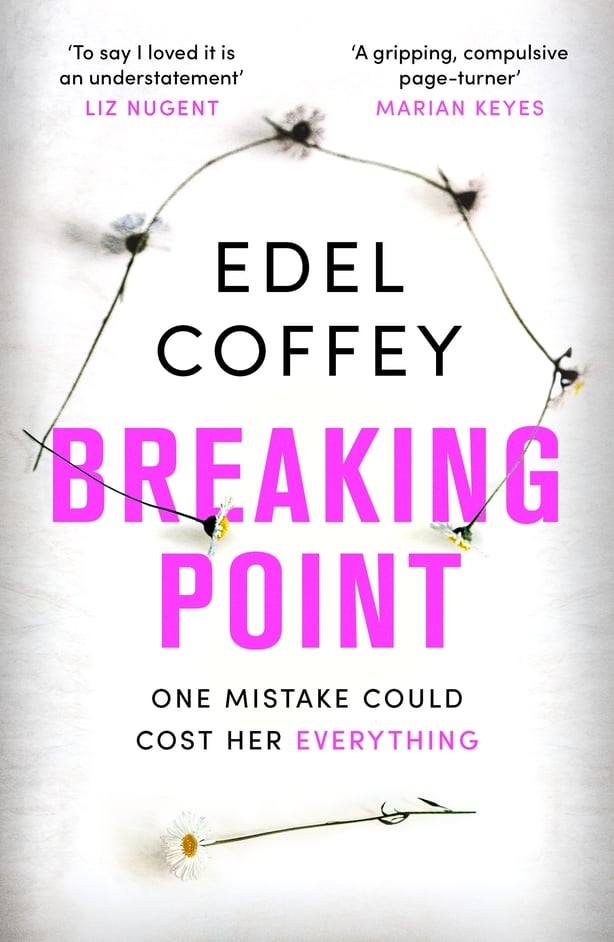We're delighted to present an extract from Breaking Point, the debut novel by Edel Coffey, published by Sphere.
An innocent mistake. A lifetime of guilt. Susannah is pulled in every direction, every day; as a doctor, a researcher, a professor, a wife, a mother and a woman. She doesn't realise it, but she is at breaking point. After a frantic morning, with a disrupted routine and an emergency call from work, Susannah leaves her young daughter in the car on a hot day. It is hours before she realises her mistake, but it is too late. Adelaide is a reporter covering Susannah's negligence trial. The story is all too familiar, stirring up the ghosts of her own long-buried past. As Adelaide and Susannah circle closer to each other, as the jury considers its verdict, both women are forced recognise that they are both already living out the worst punishment imaginable. But what will the court say?
Susannah hated waking the girls so early. They were sleeping soundly in the dark nursery, their breathing long and shallow. She could smell the dry, oaty heat of their bodies when she walked in. Louise's hair – a sprig of light blonde fluff – had just started to grow and it stood on end, wafting like an underwater plant. Susannah brushed her nose over the downy tuft as she lifted her six- month- old baby out of the crib.
She crossed the room and gently woke her other daughter, Emma, who was four years old. She was half- awake already, and protesting. Susannah wanted to protest too. She was exhausted. Louise had kept her up half the night. It was only the first day of June but New York was already sweltering through a heatwave, and despite her best efforts with the air con, it was making everyone grumpy. The forecast for today was no different.
It had been 10 p.m. when she had gotten home from the hospital last night. John had been slumped on the corner couch, an iPad propped on his knee, 24- hour news playing silently on the TV. He had stood and stretched stiffly, his long body still slim and boyish, his thick silver- grey hair flattened where he had been lying on it. He always took Susannah’s return from work as his cue to go to bed. And these days he was always asleep by the time she joined him. Susannah changed Louise’s diaper quietly and quickly in the soft glow of the morning light. She measured her weight as she carried her downstairs for breakfast. She knew Louise’s weight by feel, to the ounce, gauged it in her arms every day. She inhaled Louise’s hair deeply. So soft and silky, and that smell. How did I get this lucky? Then . . . If I’m so lucky, why am I so frustrated all the time? She tried to chase away the doubt, the guilt, shoo it like a fly from her mind. But it was persistent. An article she had read in the New York Times the previous week had said women were waiting until they were older to have children. One young woman quoted in the article asked, 'Why have children if you’re not able to enjoy them yet?’ Were you really supposed to enjoy it? Susannah loved Louise and Emma. She had never loved anyone or anything in this way before. It was a physical kind of love – sometimes it made her feel nauseated, weak, overwhelmed – but could she really say she was enjoying being a mother? She wasn’t enjoying anything at the moment. She and John never got to spend time together as a couple. They never relaxed, never hung out, never stayed in bed laughing like they used to do. And work at the hospital was busier than ever. The more successful she became, the more she had to do. Between her increasing TV commitments as a family expert, a publishing contract that demanded a new parenting book every year, and her actual job as Professor of Paediatrics at St John’s Hospital in Manhattan, the days seemed to run on ahead of her, like a too- fast playmate. And then the nights slipped into one another, telescoping down into mere minutes, as Susannah tossed on a dreamless sea, burrowed deep in a dark exhaustion until Louise’s cries punctured her oblivion.
A familiar wash of self- loathing plumed in her, like paint in water. Why could she not just be like other mothers, love her babies straightforwardly instead of second- guessing herself about every decision she made, interrogating her choices, questioning her own identity? Could she not just be patient, put aside her personal frustrations, her career goals, even for a few years, in exchange for the blessing of having children? And it was a blessing. She had undergone IVF to have Emma, and then had an unexpected natural conception with Louise. John had not been keen on having a second child. ‘We’re too old,’ he had said. ‘We’re already so busy, and Emma took so much out of you. We need to think of ourselves as well, our relationship. We should talk about this,’ he had said. She knew exactly what he meant but she wouldn’t hear of it. How could she not accept a second child so late in life as the blessing it was? In the sleepless world she now inhabited she sometimes imagined what their lives would be like if she hadn’t become pregnant a second time. She banished her thoughts with a shake of her head, fearful that bad thoughts were enough to make bad things happen. She didn’t believe in prayer but she whispered one to herself anyway.

Breaking Point by Edel Coffey (published by Sphere) is out now.

